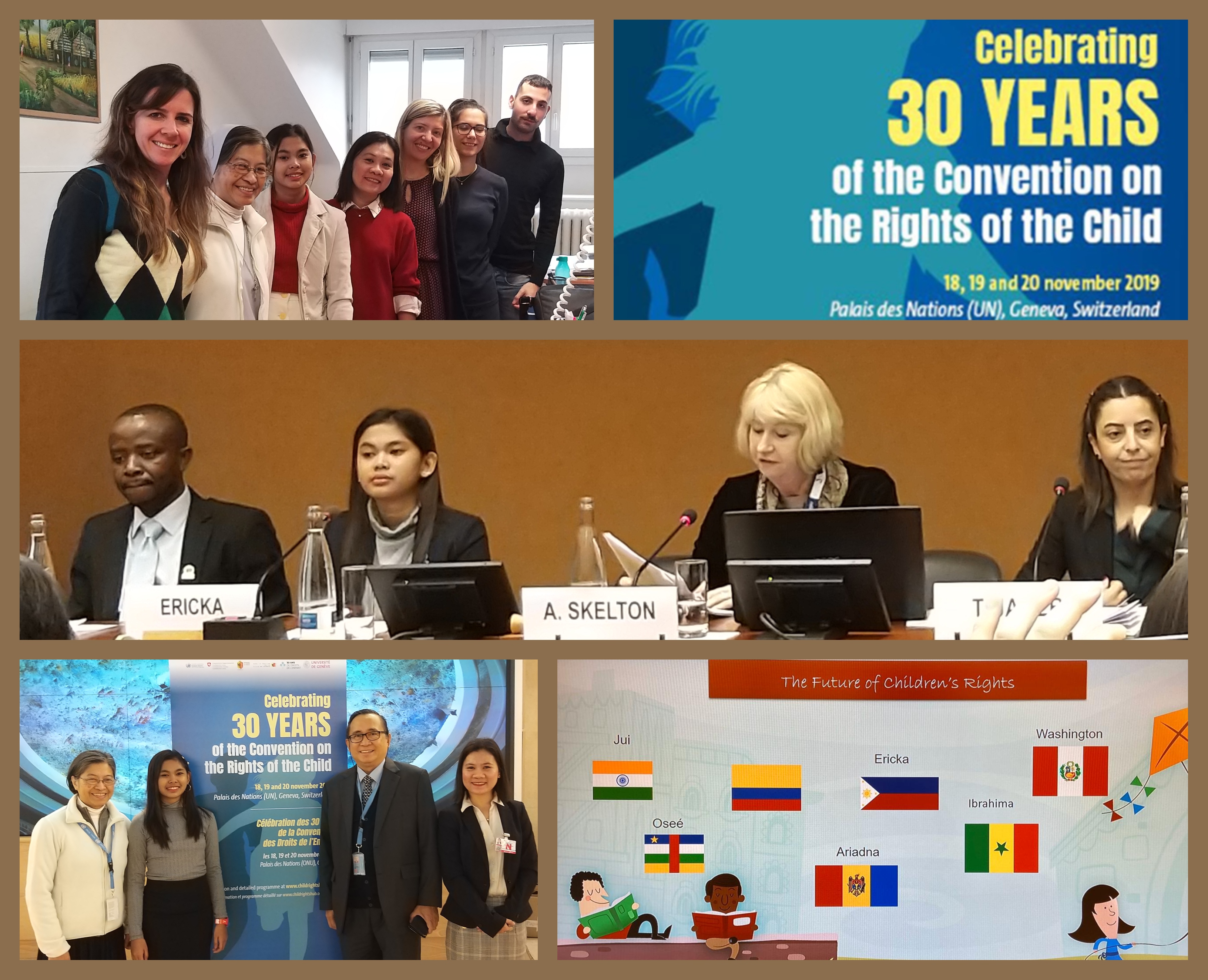
30 Years of Children’s Rights
In the occasion of the 30th Convention on the Rights of the Child anniversary, ratified in 1989 by the highest number of Countries (196) and in the fastest way than the others, a three-day commemorative celebration was held in Palais des Nations on the 18th, 19th and 20th of November in Geneva. The event, that took place in the symbolic city of the Convention writing and negotiation, was the peak of a series of events organized throughout 2019. Moreover, the “30 Years of Children’s Rights” book has been published in order to spread information about the Rights of the Children and to celebrate the role of Geneva as a platform for these rights.
800 people took part in the event, among these many children and adolescents human rights defenders. Erika Quilos, 16 years old, VIDES Philippine member was a panelist in a working group on children in conflict with the law. Her speech underscored the importance of alternative detention measures, rehabilitation centres and the minimum criminal responsibility at 15 years (conditions that unfortunately still need to be improved in the Philippines). She focused especially on the importance of tackling the root causes that lead children to commit crimes and on the importance to educate them on Human Rights so that they can enjoy them in the respect of other people.
Other participants were members of the Committee on the Rights of the Child such as vice-president Amal Salman Aldoseri, experts of governmental organizations and 16 NGOs, members of the civil society, diplomats, academics, professionals of the field such as: Najat Maalla M’jid, Special Representative of the Secretary-General on Violence against Children; Koumbou BolyBarry, Special Rapporteur on the right to education and Michel Forst, Special Rapporteur on the situation of human rights defenders.
Throughout several conferences, meetings, side events and interactive inclusive working groups, messages, experiences, tools, and good practices have been shared aiming at a new United Nations and children’s commitment to the future of Human Rights. This will be achievable through children’s participation which implies that adults must allow them to express their opinions and listen carefully to them.
The recommendations that have emerged from these dialogues stress the need to not consider the child as a passive beneficiary but as a subject of law through effective participation of children and adolescents in all the matters about them. Participation at local, national and international levels is firstly possible thanks to quality education and to child-friendly language, information spreading, especially in the field of justice. In the meanwhile, the role of the adult is not lessened but it remains crucial in the support of children and adolescents.
These were the following working groups:
- “Children’s rights studies today”
- “Child Protection”
- “Children Affected by Terrorism: A Roadmap for Action”
- “World café”
- “Justice for children, Justice with children”
- “Children’s Rights in the Age of Biotechnology”
- “The past, present, and Future of children’s environmental rights”
- “Children’s rights and women’s rights: tensions or synergies?”
- “Migration and children’s rights”
that made the following recommendations:
- invest in the research and gathering of data about Children Rights and on the claiming mechanisms in order to make them available to the civil society also in a child-friendly language;
- understand how new technologies affect their rights and how to protect them without the need to create new rights;
- strengthen the collaboration between governments and NGOs to protect children recruited in armed conflicts;
- find alternative solutions to family separations (because they are poor, members of an indigenous community, migrants or because they have disabled children or parents) through supporting programs that also aim to reunite already separated families;
- improve the access to justice especially for the most vulnerable, avoid their incarceration, promote their reinsertion at the legislative level and improve the prison conditions of mothers with little children;
- for children born from surrogacy, to have access to their origins and to preserve their relationship with donors;
- to seriously tackle climate change;
- to give children asylum seekers the same rights as the autochthons;
The recommendations proposed by the children must be a priority for the States to build a future of peace, as underscored by Philippe Jaffé, member of the Committee on the Rights of the Child and the main organizer of the event. This is possible only if efforts are focused on the implementation of the Convention on the Rights of the Child that is defined as “that living document that enshrines the rights of every child without exception to a life of dignity and self-fulfilment”, according to N. Mandela as quoted by Michelle Bachelet, High Commissioner for Human Rights, in her final speech.
On the same line, “PARTICIPATION, POWER, PURPOSE” are the three keywords identified by Ann Skelton, member of the Committee on the Right of the Child and expert in Child Law, for this celebration that has been held in a spirit of listening providing a momentum for the protection and promotion of children’s rights. For that very reason, adults must involve children and adolescents in every matter about them, as their slogan said: “Nothing about us, without us”.

